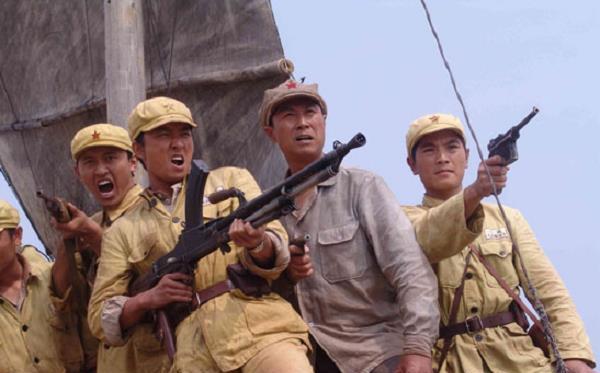The liberation of Hainan Island in 1950 was the last battle between the Kuomintang and the Communists on the mainland; after this battle, there were almost no major battles between the Kuomintang and the Communists. The Battle of Hainan Island was the first large-scale sea-crossing and landing operation conducted by our army, and the PLA successfully broke through the Kuomintang's three-dimensional defense of land, sea and air by relying only on wooden boats, which can be called a miracle in the history of Chinese and foreign wars. So who was the supreme commander of the Kuomintang and the Communists who liberated Hainan Island in 1950?

First of all, the supreme commander of our army is General Deng Hua, who came from a family of scholars in Hunan, joined the party at the age of 17, and went to Jinggangshan at the age of 18. Deng Hua was present in the five anti-encirclement and suppression campaigns in the Central Soviet Region, the Long March of Ten Thousand Miles, and the Red Army's Western Expedition; over the past few decades, Deng Hua has always been in the forefront of the revolutionary war and is a rare general in our army.
After the outbreak of the Anti-Japanese War, Deng Hua served as the director of the political office of the 685 regiment of the 115th Division, and led the troops to participate in the Battle of Pingxingguan. At the beginning of 1938, Deng Hua was promoted to political commissar of the 4th Column of the Eighth Route Army, and led his troops to open up the anti-Japanese base areas in Pingxi and the anti-Japanese guerrilla base areas in eastern Hebei, and established an anti-Japanese armed force of 100,000 people.
After the victory of the Anti-Japanese War, Deng Hua followed Lin Biao out of the customs and served as the deputy commander of the northeast security, participating in the creation of the Northeast Field Army. After the establishment of Dongye, Deng Hua served as the commander of the 7th Column, and led his troops to 5 cities in 17 days and attacked 3 elite divisions of the Kuomintang, with great achievements.
After the Liaoshen Campaign, Deng Hua led his troops into the customs and went all the way south, all the way to Guangdong. After the founding of New China, Deng Hua served as the first deputy commander of the Guangdong Military Region and the commander of the 13th Corps, and was appointed to command the 13th Corps, about 100,000 soldiers, to recover Hainan Island. The Battle of Hainan Island was a great test for the People's Liberation Army at that time, because our army had neither warships to cross the sea nor aircraft to dominate the sea. Although the Qiongzhou Strait was narrow, it was still a natural barrier for our army at that time.
Deng Hua drew lessons from our army's defeat in the sea crossing operation on Kinmen Island and adopted a combat policy of actively smuggling, small crossings in batches, and final landing. Before the formal crossing of the sea, Deng Hua quietly arranged for two groups of elite detachments of about 8,000 people to smuggle themselves to Hainan Island, and successfully lurked under the guidance of the guerrillas on the island.
According to the sneak attack, Deng Hua found out the enemy's defensive weaknesses, and finally on the night of April 16, 1950, organized 6 regiments and took more than 300 brig-canopy wooden boats to cross from the southern tip of the Leizhou Peninsula on time. Braved the shells of enemy ships and ships, the officers and men of our army sacrificed their lives to cross the sea, broke through the Kuomintang's three-dimensional defense on Hainan Island with their lives and blood, and successfully liberated Hainan Island in only half a month.
The supreme commander of the Kuomintang defense of Hainan Island was Xue Yue, a graduate of the Baoding Military Academy and a famous anti-Japanese general of the Kuomintang. Xue Yue was born in the Cantonese Army, served as the battalion commander of Dr. Sun Yat-sen's guard battalion, and was known as Xue Hu on the battlefield, fighting fiercely. During the Anti-Japanese War, Xue Yue commanded four battles of Changsha, created his own heavenly furnace tactics, annihilated 100,000 Japanese troops, and caused a sensation at home and abroad.
Xue Yue is recognized as the Chinese general who annihilated the Japanese army the most in the War of Resistance Against Japanese Aggression, and is known as the god of war against Japan. However, Xue Yue was not a concubine of Chiang Kai-shek, and had a black history of opposing Chiang Kai-shek, so he was not used by Chiang Kai-shek. When the Kuomintang defeated the mainland, Xue Yue was appointed commander of the defense of Hainan Island, leading the remnants of the defeated soldiers who had retreated from Guangdong to defend Hainan Island.
After Xue Yue arrived in Hainan, he first reorganized the Kuomintang army that had been defeated and retreated from the mainland to carry out reorganization and rotation training to restore the morale of the army. He then applied to Chiang Kai-shek to transfer the Kuomintang Navy's Third Fleet and four air force brigades to assist in the defense of the Qiongzhou Strait. After several months of painstaking management, Xue Yue built a solid three-dimensional defense system around the island on Hainan Island.
However, under the general trend, Xue Yue's efforts were doomed to be in vain, and the Kuomintang army had long become a bird of fright, and did not dare to fight with the People's Liberation Army. As soon as the People's Liberation Army landed on Hainan Island, the Kuomintang defenders collapsed, and coupled with the fact that there were tens of thousands of guerrillas on the island, Xue Yue could only flee from Hainan Island with hatred.